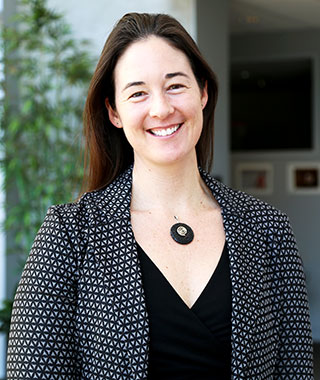
For Brooke Evans, PhD’19, working at the Washington State Hospital Association is an opportunity to combine her years of experience in clinical social work with the policy, data analysis and implementation skills she gained in Heller’s PhD program.
As the director for behavioral health and opioid stewardship on the safety and quality team, Evans provides member hospitals across Washington state with the big data sets and training they need to improve the quality of health care for patients. She holds webinars, provides coaching, and gathers health care professionals to discuss best practices and strategies. Her focus is primarily on patients with behavioral health conditions, including those with opioid use disorders (OUDs), as well as how hospitals and providers can be better stewards of opioids.
“A year ago, I didn’t know that the job I’m doing now even existed,” Evans says. “It’s been fun to get my feet wet again – and talking clinical with providers of all different kinds, and combining that with how we can use data in quality improvement work.”
Her work on opioid stewardship has three prongs. First, she helps hospitals figure out ways to improve prescriber practices around opioids. Second, she’s working with hospitals on overdose prevention, including dispensing naloxone, which can reverse an opioid overdose. Third, she’s helping to increase access to medication-assisted treatment for patients with OUD.
Evans had only been on the job for four months when the COVID-19 crisis struck, pulling many members of her safety and quality team to work directly on measures to combat the pandemic. Her goal now is to make sure that patients with behavioral health conditions don’t fall through the cracks during this crisis.
“We’re helping hospitals connect with resources to treat patients with COVID-19 in psychiatric facilities, continuing to provide mental health care, and supporting patients who need medications for OUD,” she says. “In some ways the crisis has propelled change. Hospitals now have to figure out how to use telehealth, which is something we had been pushing for. This could be a turning point, but we’ll have to see what happens when we come out of it.”
Evans’ career has spanned clinical and policy realms. Evans got her first taste of the policy world when she took a fellowship with the Congressional Hunger Center in Washington, D.C. after college. “I realized to understand policy and to do it well, I had to get in the trenches and see health care systems at work.”
That led her to return to her home state of Hawaii to pursue her master’s in social work. During her studies, she worked nights in the emergency room, where she developed her passion for working with patients in crisis.
After working for several years as a clinician, she took her skills abroad, joining the Peace Corps in Mongolia.
“To see social work in a developing country and have a different lens and approach, I learned again how much I appreciated understanding the bigger picture of macro systems of care,” she says. There, she met a Heller alumna, who recommended Heller to Evans as she started to think about pursuing a doctoral degree. As she learned about Heller’s health policy expertise and tight-knit community of returned Peace Corps volunteers, she decided it would be an ideal fit.
At Heller, Evans was a National Institute on Alcohol Abuse and Alcoholism (NIAAA) fellow. For her dissertation, she worked with the state of Vermont as it implemented a five-year federal grant focused on Screening, Brief Intervention, and Referral to treatment (SBIRT). She worked on a portion of the evaluation, obtaining quantitative data on patient demographics and intervention outcomes and interviewing health care workers at four different medical sites.
“It was a really great experience to see how data informs real-time practice change in health systems,” Evans says. “The Heller PhD experience is truly unique. There were so many different paths I could have taken, but I’m so grateful for my experience at Heller, and excited to see where my degree takes me.”
